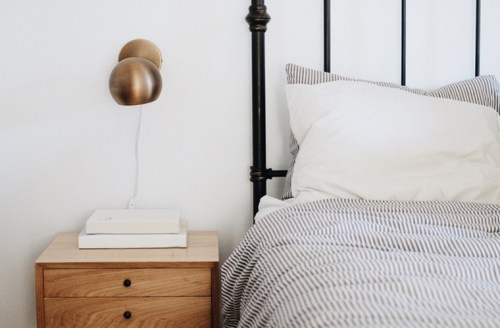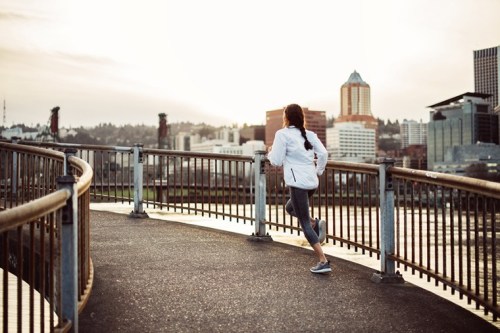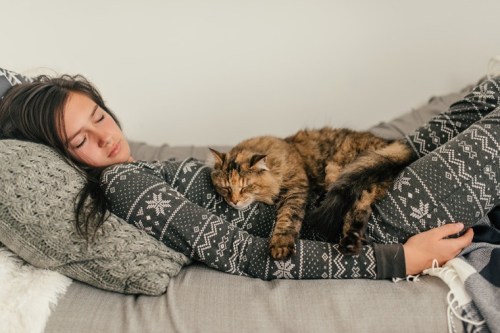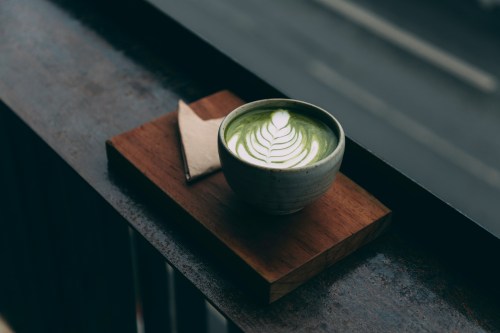If you’re one of the 164 million Americans who struggle to get enough zzz’s, you may have the first Sunday in November marked with praise hands in your calendar. It’s the day we “fall back,” or gain an extra hour of sleep by transitioning out of Daylight Saving Time—something you can surely appreciate even if you’re not waking up to run the New York City Marathon.
But with the earlier sunrise comes shorter, darker days. And, according to a 2013 study published in the journal Sleep Medicine Reviews, there’s little evidence to suggest you actually get extra sleep that first night. In fact, you’re more likely to toss and turn, rise earlier, or experience an overall feeling of sleepiness (and perhaps sleeplessness) for the next week as your body adjusts to the new schedule, the researchers report.
“Many people don’t or can’t take advantage of the extra hour due to their own circadian rhythms.”
“Many people don’t or can’t take advantage of the extra hour due to their own circadian rhythm,” says Teofilo Lee-Chiong Jr., MD and chief medical liaison for Philips Respironics.
But just because falling back is inevitable doesn’t mean your body and mind need to suffer. According Dr. Lee-Chiong, your biological clock is controlled by a mix of internal and external factors, like sunlight and temperature, so there are changes you can make to your routine in order to temper that “out of whack” feeling you have when the clocks change.
After you trick out your bedroom with these dreamy accessories, follow these tips for better sleep come Sunday night.

1. Adjust indoor lighting
Regular exposure to light and darkness has a major effect on your circadian rhythm, so when twilight begins to creep earlier and earlier, you’ll need to play with your lamps, dimmers, and overhead lights in order to balance things out. “Our biological clock, which is fed by exposure to light, will drift earlier,” says Johns Hopkins University’s Jeffrey Ellenbogen, MD. “The simple way to counteract that drift is to get light exposure in the evening.”
If you’re not chained to a 9 to 5 schedule, Dr. Ellenbogen says the best solution would be to “just go with the shift” by both rising and hitting the hay earlier. “Early-bird dinners weren’t meant just for older people,” he says. “Without making conscious choices for the correction, the tendency will be to be more tired in the evening and more energetic in the morning.”

2. Get outside
Similar to how you tweak the lights inside, by spending time outside in the sunlight you can help your body naturally adjust to this seasonal jet lag. In fact, a February 2017 study found that spending just two days camping in the great outdoors—you know, with hiking boots, tents, and all—can shift your circadian timing to the earlier schedule Dr. Ellenbogen recommends and help you get more sleep. Translation: Get outside and soak up some sun (with SPF 30 or more, of course), because even a little bit of natural light will help your body’s clock reset.

3. Practice a daily a.m. and p.m. ritual
There’s a reason so many successful people swear by consistent morning and evening routines: They work. Shoshana Ungerleider, MD, of Sutter Health’s California Medical Center in San Francisco, says you can get your body clock back on track—and keep it regular—by planning out exactly what you’ll do the hour you rise and the hour or two before bed. (Need inspo? Check out Miranda Kerr’s a.m. to-dos.)

4. Sweat at the same time
Likewise, for the week following the clock change, Dr. Ungerleider recommends scheduling a daily sweat session for roughly the same time each day. Whether it be a yoga class, a quick jog, or a full-on, all-out HIIT class that leaves you soaked, a workout will help you hit reset. Research published in Mental Health and Physical Activity confirms that doing 150 minutes of moderate or vigorous exercise a week boosted individuals’ sleep quality by an impressive 65 percent. And just as the morning and evening rituals do, a daily exercise habit will help you readjust faster, too.

5. Take a cat nap
According to Harvard Medical School, short, well-timed naps—think 20 to 30 minutes, ideally in the morning—can leave you refreshed. Doze longer or later and you run the risk of waking from a deeper sleep, leading you to feel confused and groggy. Bottom line: You don’t want to get the first deep sleep of the night during the day; it’ll leave you grouchy and irritable, even with that “extra hour” of sleep.
Originally published on October 31, 2017; updated November 2, 2018.
Now, treat yourself to some bedroom luxuries like one of these top-rated silk pillowcases for smoother skin and shiny hair or try Jenna Dewan-Tatum’s fall-asleep-fast essential oil blend.
Sign Up for Our Daily Newsletter
Get all the latest in wellness, trends, food, fitness, beauty, and more delivered right to your inbox.
Got it, you've been added to our email list.











